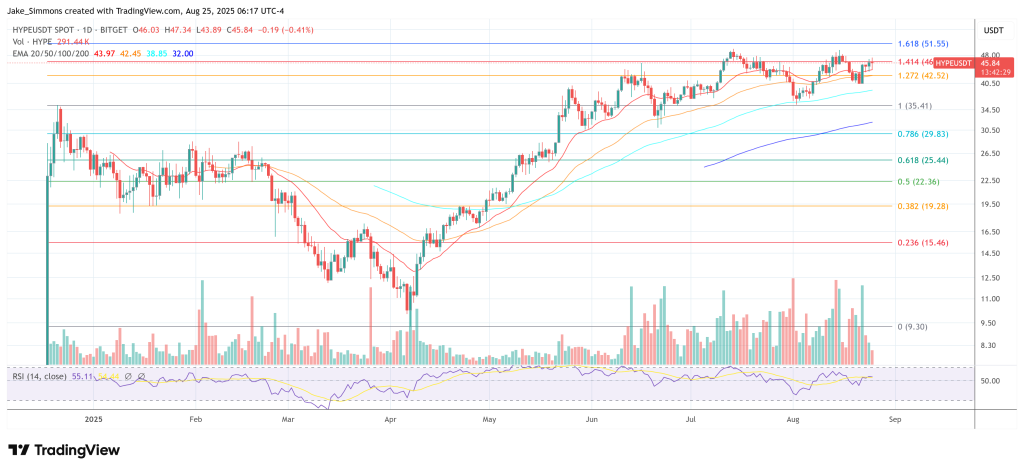Reason to trust

Strict editorial policy that focuses on accuracy, relevance, and impartiality
Created by industry experts and meticulously reviewed
The highest standards in reporting and publishing
Strict editorial policy that focuses on accuracy, relevance, and impartiality
Morbi pretium leo et nisl aliquam mollis. Quisque arcu lorem, ultricies quis pellentesque nec, ullamcorper eu odio.
BitMEX co-founder and crypto-legend Arthur Hayes used the main stage at Tokyo’s WebX 2025 to unveil a blunt, numbers-first valuation case for Hyperliquid’s HYPE token. On a slide headed “Hyperliquid: 126x Upside,” Hayes’ family office Maelstrom modeled how an accelerating stablecoin economy could reprice the decentralized perps exchange dramatically higher.
Why HYPE Could Be The Best Crypto Bet
The slide’s premise was explicit: “Stablecoin Expansion To Boost Annualized Fees To $258B,” with a 0.03% net trading-fee assumption, a 5% discount rate, and a “Terminal Value of HYPE Rev” of $5.161 trillion versus a current fully diluted valuation near $41.05 billion—yielding an “Upside Potential 126X.” In his talk, Hayes told the audience he expects HYPE “to 126x over the next three years.”
The timing of the forecast coincides with a burst of on-chain and trading-venue milestones for Hyperliquid. According to data highlighted during and around the event, Hyperliquid open positions hit a record 196,462 on Sunday, open interest climbed above $15 billion, total wallet equity peaked near $31 billion, and Sunday volume set a high around $19.46 billion for weekends, per DefiLlama.
Related Reading
A research note from Redstone last week argued the venue has, within two years, captured “over 75% of the entire decentralized perpetual exchange market,” challenging dYdX and, at times, approximating Binance volumes on select pairs.
Hayes’ 126x case rests on a macro-to-micro bridge: a world where stablecoin float expands to roughly $10 trillion by 2028, Hyperliquid’s share of average daily volume reaches 26.4%, and that activity translates into $258 billion of annualized fees for the protocol.
The geometry of the model is what matters: if volumes and fees scale with the stablecoin base and if HYPE continues to be the instrument that reflexively captures protocol economics, the implied terminal value dwarfs the token’s present FDV. Those inputs, assumptions, and outputs were all printed on the Maelstrom slide on stage in Tokyo.
Related Reading
Crucially, Hayes has been backing the thesis with capital. On August 15, on-chain sleuth Lookonchain flagged that Arthur Hayes bought more HYPE, LDO, and ENA, detailing cumulative five-day purchases that included 58,631 HYPE alongside 1,750 ETH, 3.1 million ENA, 1.29 million LDO, 184,610 PENDLE, and 420,000 ETHFI (about $15.9 million in total at reported valuations).
The structural backdrop helps explain why a stablecoin-led model resonates for Hyperliquid. The exchange is a decentralized venue for perpetual futures, letting traders take leveraged exposure without expiry; it runs on its own L1 and has seen sustained growth in both open interest and fee generation in 2025.
Hayes has talked up HYPE before—publicly floating a nearer-term $100 price marker back in May—yet Monday’s deck was his most explicit attempt to tie a 2028 outcome to quantifiable drivers. Whether the path requires a $10 trillion stablecoin base and a quarter-share of decentralized perps ADV is the crux of the debate. But the mechanism he emphasized—fee throughput scaling with stablecoin adoption, captured in token value—matches how many analysts already frame HYPE’s design, where protocol revenues and buybacks link the token to venue performance.
At press time, HYPE traded at $45.84.

Featured image created with DALL.E, chart from TradingView.com




Leave a Comment